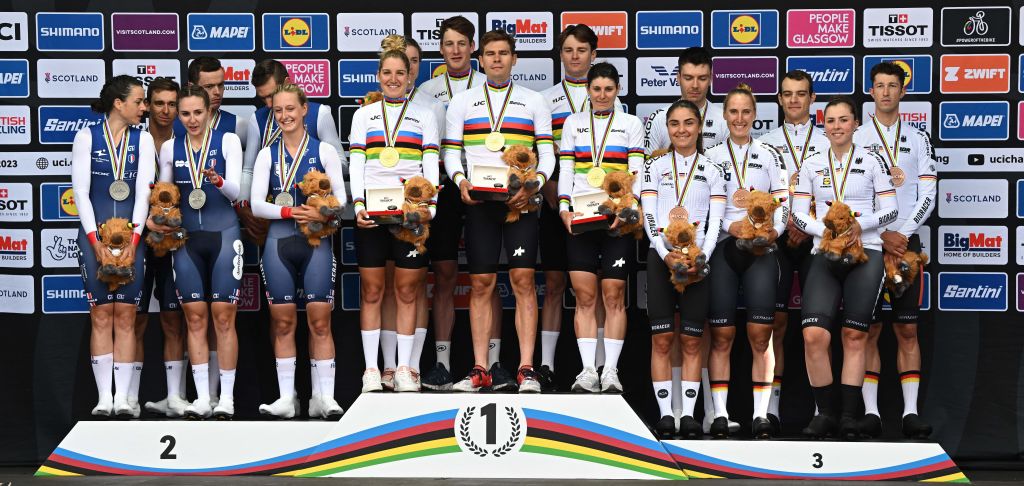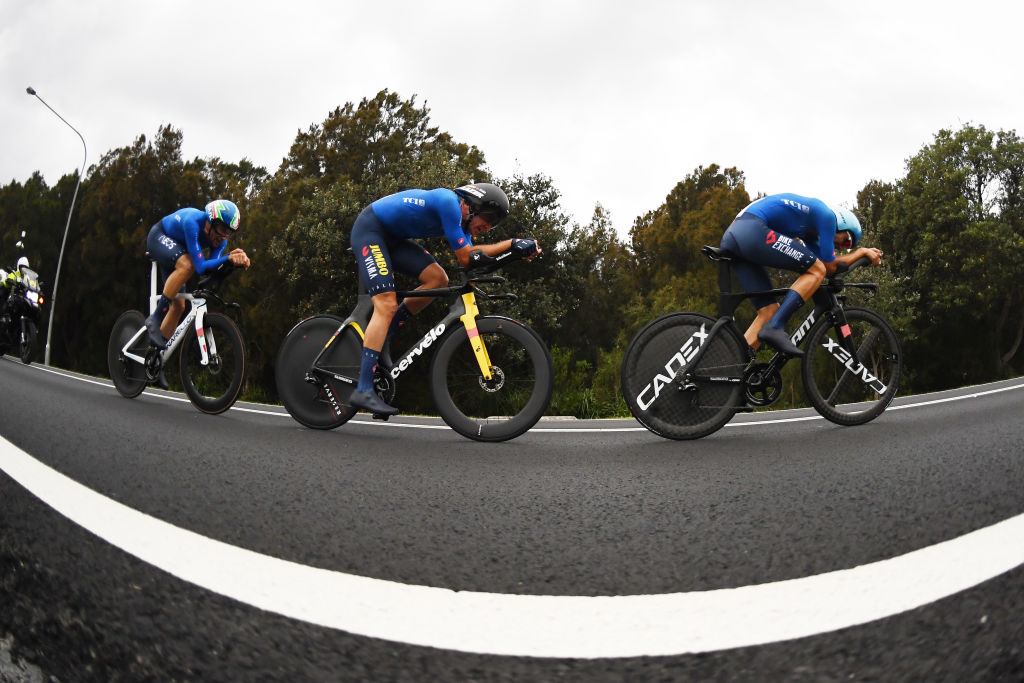Mixed relay still struggling to capture the imagination at World Championships
After five years, team time trial event is still waiting for its Femke Bol moment

The introduction of the mixed 4x400 metres relay to major championships has been a striking innovation in athletics in recent years. Any initial scepticism about the new event’s merits has receded in the years since it was added to the World Athletics Championships schedule in 2019.
Confirmation, if it were needed, arrived this summer when the mixed relay provided one of the most indelible moments of the entire Paris 2024 Olympics, with Femke Bol conjuring up an astonishing final leg to run down three athletes and claim gold for the Netherlands. That thunderous occasion provided the ideal curtain-raiser for the remainder of the track and field programme at the Stade de France.
In cycling, on the other hand, the jury is still out on the value of the mixed team relay, at least in its current format. On Wednesday afternoon, the discipline features at the World Championships for the fifth time, but it remains marooned somewhere between a novelty and an afterthought. The widespread apathy towards the mixed relay from riders and federations – not to mention an uninspiring format – means that the event seems highly unlikely to enjoy its own Femke Bol moment in Zurich this week.
Enthusiasm for the mixed relay has been lukewarm in the build-up to these World Championships, as testified by the notable absentees. The Netherlands, winners of the inaugural edition in 2019, decided against competing altogether here, with Belgium also opting out for the first time since the event’s introduction.
“In practice, it is not easy to get riders together in a busy season to train on this. And without good preparation, a podium finish is hard to achieve,” national coach Koos Moerenhout explained to De Telegraaf. “As it is now, it also goes against the professional approach of all other top races, whether they are with national teams or trade teams.”
Switzerland are chasing a third successive mixed relay world title on Wednesday, but the host nation will do so without their best female and male time triallists. Once Marlen Reusser was ruled out of the Worlds by long COVID, her counterpart Stefan Küng began to rethink his participation in the race.
“With Marlen out, our chances are not as high as they usually would be, so we will see,” Küng told Cyclingnews earlier this month, and there was no surprise when his name did not appear on the official start list released on Tuesday morning.
The latest race content, interviews, features, reviews and expert buying guides, direct to your inbox!
23 nations will line out, including notably strong delegations from Italy, Australia and the USA, as well as representatives from the World Cycling Centre, Rwanda and Afghanistan, but it’s hard to shake off the sense that some federations are simply fulfilling a fixture. Then again, that was already clearly the case with the trade team time trials that opened the Worlds between 2012 and 2018.
Perhaps the problem with the mixed relay event at the World Championships lies not in the general concept but in its execution. A relay with just one changeover is scarcely a relay at all. Instead, the event has the feel of two separate team time trials that have been hastily sutured together.
The mixed relay at the Cyclocross Worlds, on the other hand, provides a more coherent narrative to viewers because it is run off in a format already familiar from athletics or swimming relays. Individual riders from each nation race against one another before tagging in their next compatriot.
At the Tábor Worlds this year, for instance, the cyclocross mixed relay provided the kind of late drama that is impossible in the team time trial format used at the Road Worlds, with Aubin Sparfel edging out Great Britain’s Cameron Mason in a tight sprint to claim gold for France.
Cyclocross and road are two very different disciplines, of course, and one wonders if there would be any more enthusiasm from federations and riders for an individual format on shorter laps in the middle of a World Championships. But five years into the experiment, the UCI must be aware of the mixed relay’s ongoing struggle to capture the imagination in the team time trial format.
Italy the favourites

There is a world title on the line on Sechseläutenplatz on Wednesday afternoon, of course, and the lure of a rainbow jersey has sufficed to encourage time triallists of the calibre of Filippo Ganna and Grace Brown to take the start in Zurich.
In Yorkshire in 2019, the mixed relay encompassed two laps of a 14km circuit, but this year’s event is almost twice the length. The race takes place on the hilly, 26.6km circuit that will be used for the road races later in the week, meaning that the total distance will be some 53.7km. The short, sharp climb of Zürichbergstrasse (700m at 8.4%) and the longer ascent of Witikon (1.4km at 7.2%) will make pacing a real conundrum for the trios of riders on the course.
“I’d say it’s a bit unusual for a time trial, especially a team time trial,” Italian coach Marco Velo told BiciPro. “I think it will be quite severe for three riders, not so much because of the climbs but because all the descents and the various dangerous sections.”
In keeping with the format of previous editions, each nation’s trio of male riders will take the first leg before tagging in their female counterparts for the second lap. The women’s trio can set out on the arrival of the second man, while the final time at the finish is taken once the second rider crosses the line.
The Italian sextet are the obvious favourites for the title, with time trial medallists Ganna and Edoardo Affini joined by Mattia Cattaneo in the first leg, while Elisa Longo Borghini rides with Soraya Paladin and Gaia Realini in the second. Cattaneo and Affini are the only riders here from the team that won the mixed relay at the European Championships, but that victory was itself an indication of Italy’s emphasis on the discipline.
Germany is another country that has targeted the mixed relay over the years, claiming gold in 2021 and bronze a year ago. Antonia Niedermaier, fourth in the individual time trial on Sunday, is essential to their challenge here, while Max Schachmann looks well suited to a test on a course as rolling as this one.
Australia will be anchored by a women’s trio that features Olympic and world time trial champion Grace Brown, as well as Brodie Chapman and Ruby Roseman-Gannon. Their men’s trio, meanwhile, seems to have been smartly selected with this demanding course in mind.
Ben O’Connor arrives fresh – in a manner of speaking – from a sparkling Vuelta a España, while Michael Matthews has a notable pedigree in team time trialling. Jay Vine, meanwhile, has been passed fit to race after the late crash that denied him a likely medal in Sunday’s individual time trial.
A very solid USA squad includes Brandon McNulty, Neilson Powless and the experienced Amber Neben, while Denmark can rely on Mikkel Bjerg and Cecilie Ludwig. The absence of Küng and Reusser severely limits Switzerland’s prospects of a threepeat, but Stefan Bissegger will hope to make amends for a subdued outing in Sunday’s individual time trial.
A strong home showing in the mixed relay would undoubtedly add something to the atmosphere in Zurich on Wednesday afternoon, but as at World Championships past, it’s rather less certain that the event will leave a lasting impression.

Barry Ryan was Head of Features at Cyclingnews. He has covered professional cycling since 2010, reporting from the Tour de France, Giro d’Italia and events from Argentina to Japan. His writing has appeared in The Independent, Procycling and Cycling Plus. He is the author of The Ascent: Sean Kelly, Stephen Roche and the Rise of Irish Cycling’s Golden Generation, published by Gill Books.